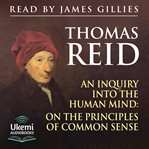Nonfiction
eAudiobook
Details
PUBLISHED
Made available through hoopla
EDITION
DESCRIPTION
1 online resource (1 audio file (11hr., 58 min.)) : digital
ISBN/ISSN
LANGUAGE
NOTES
Read by James Gillies
Though now little known outside specialist philosophical circles, the Scottish philosopher Thomas Reid (1710-1796) is remembered both for the founding of the Scottish School of Common Sense and his major work, An Inquiry into the Human Mind: on the Principles of Common Sense (1764). With his feet firmly on the ground, he challenged the speculative ideas of David Hume and George Berkeley, who regarded ideas in the mind as a basis for the external world. Instead, the pugnacious but lively Reid took a much more 'common sense' view in basing his ideas of reality on sensus communis. Starting from a Ciceronian, stoical platform, he developed his views on more rational attitudes towards reality - 'direct realism'. In embarking upon An Inquiry he took a critical stance specifically against John Locke and the Treatise of Human Nature (1739) as he declared in his opening statement. 'I THOUGHT it unreasonable...upon the authority of philosophers, to admit a hypothesis, which, in my opinion, overturns all philosophy, all religion and virtue, and all common sense: and finding that all the systems concerning the human understanding which I was acquainted with, were built upon this hypothesis, I resolved to inquire into this subject anew, without regard to any hypothesis. WHAT I now humbly present...is the fruit of this inquiry, so far only as it regards the five senses; in which I claim no other merit, than that of having given great attention to the operations of my own mind, and of having expressed, with all the perspicuity I was able, what I conceive every man, who gives the same attention, will feel and perceive.' Thomas Reid became professor of moral philosophy at the University of Glasgow, which underscored his importance, though he swam against the main philosophical tide. Even Hume, on reading An Inquiry, acknowledged that the work 'is wrote in a lively and entertaining manner'. By restricting himself to an examination of the five senses 'and the principles of human mind which are employed about'...Reid concluded 'we have attempted an inquiry only into one little corner of the human mind; that corner which seems to be most exposed to vulgar observation, and to be most easily comprehended'. An Inquiry is read in a characterful manner by James Gillies
Mode of access: World Wide Web







